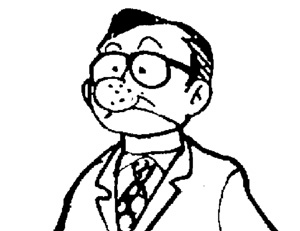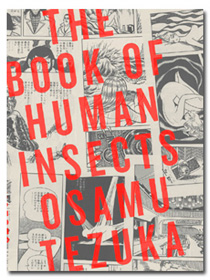“I’m not crazy! I’m just serious!”
The Book of Human Insects
By Osamu Tezuka
Translated by Mari Morimoto
Graphic Novel / Manga
Paperback, 368 pages
978-1-935654-77-3 Buy.
U.S.$16.95 / CAN$18.95
Begun in 1970 as baby boomers were graduating from college and entering the workforce in droves, The Book of Human Insects not only stands as one of comics master Osamu Tezuka’s first satisfying thrillers for a post-teen audience but also as a prescient critique whose actuality only fully registers today.
Still in her early twenties, beautiful Toshiko Tomura (b. 1947) has won the Akutagawa Prize for her story “The Book of Human Insects.” The great honor is not her first: she has previously won the New York Design Academy Award, before which she was the lead actress of an established theatrical troupe. Yet, while the media go abuzz, the woman in the limelight slips away from the metropolis; what the sole paparazzo who manages to trail her to an abandoned country house witnesses is an immobile figure of an old woman and the star herself, naked, in a reverie as bizarre as it is erotic…
Featuring a noir cast of jaded journalists, anarchist hit men, right-wing shadow brokers, cutthroat executives, and spent artists, The Book of Human Insects traces the career of an ingenue who is every bit those men’s match but is far from a feminist role model. In step with a heroine who is equally self-seeking, the usually “humanist” author here achieves with a Wellesian smirk a portrait of a world without heroes.
Flitting like a butterfly from one field to another, never tied to any single one, absorbing influences with rapacity, Toshiko Tomura’s metamorphose are all the more intriguing set against the ongoing transformation of the author himself, who famously included the character for “insect” in his pen name. Despite being serialized only at the dawn of postmodernity, what The Book of Human Insects captures with bravura conviction—and some visceral fear—is the progressively protean and neotenic nature of man- and womankind.
Titled after French natural historian Fabre’s classic essays on the lives of insects and also known as Human Metamorphosis, this stand-alone volume demonstrates Osamu Tezuka’s ability to remain forever familiar to us, and forever strange.
 Osamu Tezuka
(1928-89) is the godfather of Japanese manga comics. He originally intended to become a doctor and earned his degree before turning to what was still then considered a frivolous medium. His many early masterpieces include the series known in the U.S. as Astro Boy and Kimba the White Lion. From the early seventies on, he increasingly targeted older readers as well, employing a grittier style and mature themes. With his sweeping vision, deftly intertwined plots, and indefatigable commitment to human dignity, Tezuka elevated manga to an art form. Since his passing, his international stature has only grown, his eight-volume epic Buddha winning multiple Eisner and Harvey Awards in the United States.
Osamu Tezuka
(1928-89) is the godfather of Japanese manga comics. He originally intended to become a doctor and earned his degree before turning to what was still then considered a frivolous medium. His many early masterpieces include the series known in the U.S. as Astro Boy and Kimba the White Lion. From the early seventies on, he increasingly targeted older readers as well, employing a grittier style and mature themes. With his sweeping vision, deftly intertwined plots, and indefatigable commitment to human dignity, Tezuka elevated manga to an art form. Since his passing, his international stature has only grown, his eight-volume epic Buddha winning multiple Eisner and Harvey Awards in the United States.
Mari Morimoto has been translating Japanese comics into English professionally from before “manga” was a buzzword. Her resume encompasses some of the most recognized titles including Dragonball, Inuyasha, and Naruto. Also a practicing veterinarian, she lives in New York City.
A NEW YORK TIMES BESTSELLER
“A sophisticated, nightmarish and thoroughly adult tale despite the cartoonish conventions of Tezuka’s art, this handsome volume
reaffirms the definitive role the creator of Astro Boy had in elevating manga to serious literary status.”
—Time Out New York
“Brilliant. Just once, I’d like to read a work by Tezuka that wasn’t either at least nearly or totally perfectly crafted… A
typical complaint nowadays is that the usual comic costs about $4 and takes about 10 minutes (or less) to read. But with Tezuka’s work,
you’re invited to linger over a page for a minute, just taking everything in. One of Tezuka’s (many) skills is his deftness with
background details, with an emphasis on lived-in spaces that seem to have texture that you could just grip.”
—MTV Geek
“I suppose just reading a story like that could be repugnant to some people, but I found it weirdly enjoyable. It’s not like Tezuka
sugarcoats his lead’s fundamental awfulness, or blatantly asks that we enjoy it as she destroys people—even in that ‘hate the
player/love the game’ way that you saw all over pop culture in the early 1970s. It’s most fascinating to me as a big ol’ hate
letter to the emerging Japanese post-war generation, although Tezuka includes a vile war-era criminal in the book as well.”
—The Comics Reporter
“Even those who have read Osamu Tezuka’s Buddha series are likely to be startled… It’s an unbelievably bleak, unsentimental
indictment of human life that makes no attempt to impart anything like a moral, ending with a conclusion that’s as cold as its main character.
But ultimately it’s a compelling work, meant for a genuinely mature audience, skillfully told by the undisputed master of manga.”
—ICv2
“It is a riveting experience with so much to think about that multiple readings will not only be in order, but also a great pleasure because
this is quality manga from page one… I have read a lot of Tezuka, almost everything of his that has been released in English actually,
and The Book of Human Insects is amazing… It stands up with Ode to Kirihito and MW as one of his best but doesn’t
have any/many strange quirks that might throw off new readers… A must-own volume from both Vertical and Tezuka. Grade: A+”
—Fandom Post
“It is amazing that Tezuka manages to connect everything together the way that he does… Whether you choose to read his works as social
commentary or simply for entertainment value as a psychological thrill ride The Book of Human Insects will deliver a great experience…
For those old enough this is one manga worth reading as Vertical once again delivers a quality release of another great Tezuka story. Grade: 4.5/5”
—Examiner.com
“Tezuka is never one to shy away from outrageous melodrama, even downright bathos, and fantasy, but Insects is disturbingly credible for
all its dramatic license and exaggeration… Vertical seems to approach Tezuka’s books like another publisher would approach the latest
Jonathan Lethem or Jonathan Franzen novel: with utmost respect and seriousness… Insects is well worth reading, but it’ll also
look good on the shelf once you’re done. But don’t just let it sit there. Loan it to a friend.”
—TETSUOBROKER2099
“Perhaps in a story like this, sympathy or even empathy is not the point: we are simply here to bear witness to behavior. We weren’t really
supposed to applaud Mersault in The Stranger or Alex in A Clockwork Orange or William Gaddis’s J.R., but observe them
in their full dimension and let that speak for itself… When you’re reading it you’re not going to be thinking about anything
except wondering what the hell happens next, which is just as it ought to be.”
—Genji Press
“Adds another layer onto his bibliography… The best description for Tezuka’s style is ‘eminently readable.’ You won’t
ever pick up a Tezuka novel and be confused about how to read the page… The Book of Human Insects is, as usual for Tezuka, a treat.
His cartooning is wonderful, his writing relentlessly focused, and his plotting just that right balance of creepy and exciting. You don’t
cheer for Tomura, not by any means, but you definitely spend the book’s 368 pages eager to see what she manages to do next.”
—Comics Alliance
“Tezuka demands that the reader be invested in the outcome of her schemes. You don’t necessarily need to root for her, though I found myself
doing so more than made me entirely comfortable… It’s a compelling story with a moral, though satirical core, taking the flaws of a
generation to almost ridiculous extremes and crafting a thriller from that starting point. It’s great looking, possessed of a sexy energy
that Tezuka’s adult works don’t always achieve with this level of confidence.”
—Manga Curmudgeon
“My perception of her made a profound shift as the story progressed, and I eventually came to pity her in many ways. Part of this has to do with
the way Tezuka shows her through so many different mirrors… This is some of the finest Tezuka to come out of a publisher known above all
others as one that deals in the finest Tezuka. Like MW and Ode to Kirihito before it, The Book of Human Insects will
challenge whatever preconceived notions you have about Osamu Tezuka.”
—Otaku USA
“Human Insects is easily as disturbing as last year’s Ayako… As always, Tezuka builds long, winding plotlines and then
brilliantly connects them to each other, creating a massive but memorable network of characters… Action always comes first in the
straightforward, flowing layouts, and the lack of comedic outtakes reveals the artist at his most serious… It may not be as insanely long as
some of the other ‘Dark Tezuka’ masterpieces, but it is no less satisfying.”
—Anime News Network
 Osamu Tezuka
(1928-89) is the godfather of Japanese manga comics. He originally intended to become a doctor and earned his degree before turning to what was still then considered a frivolous medium. His many early masterpieces include the series known in the U.S. as Astro Boy and Kimba the White Lion. From the early seventies on, he increasingly targeted older readers as well, employing a grittier style and mature themes. With his sweeping vision, deftly intertwined plots, and indefatigable commitment to human dignity, Tezuka elevated manga to an art form. Since his passing, his international stature has only grown, his eight-volume epic Buddha winning multiple Eisner and Harvey Awards in the United States.
Osamu Tezuka
(1928-89) is the godfather of Japanese manga comics. He originally intended to become a doctor and earned his degree before turning to what was still then considered a frivolous medium. His many early masterpieces include the series known in the U.S. as Astro Boy and Kimba the White Lion. From the early seventies on, he increasingly targeted older readers as well, employing a grittier style and mature themes. With his sweeping vision, deftly intertwined plots, and indefatigable commitment to human dignity, Tezuka elevated manga to an art form. Since his passing, his international stature has only grown, his eight-volume epic Buddha winning multiple Eisner and Harvey Awards in the United States.
